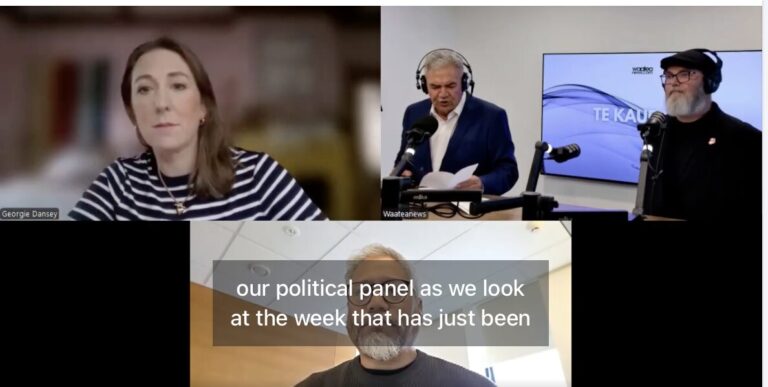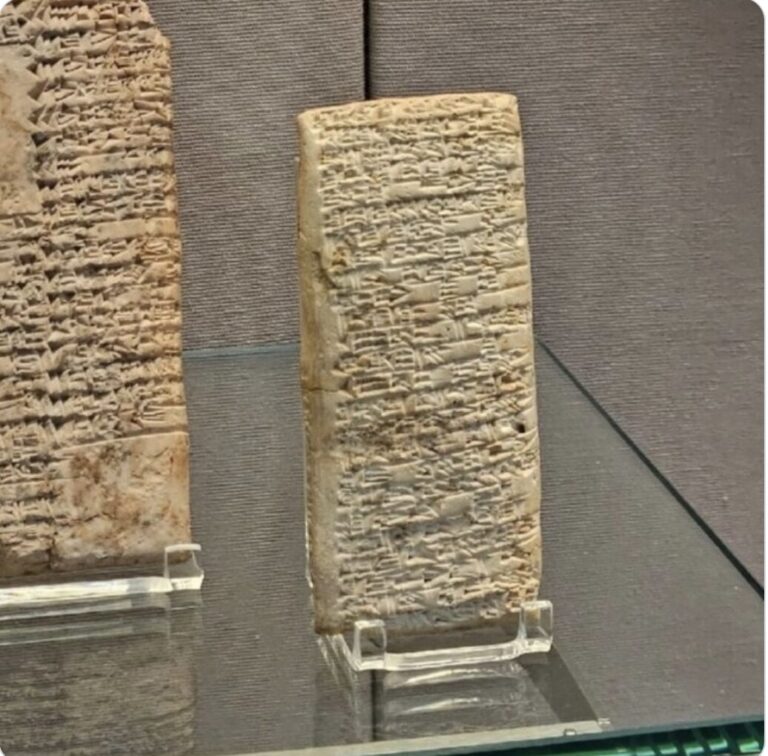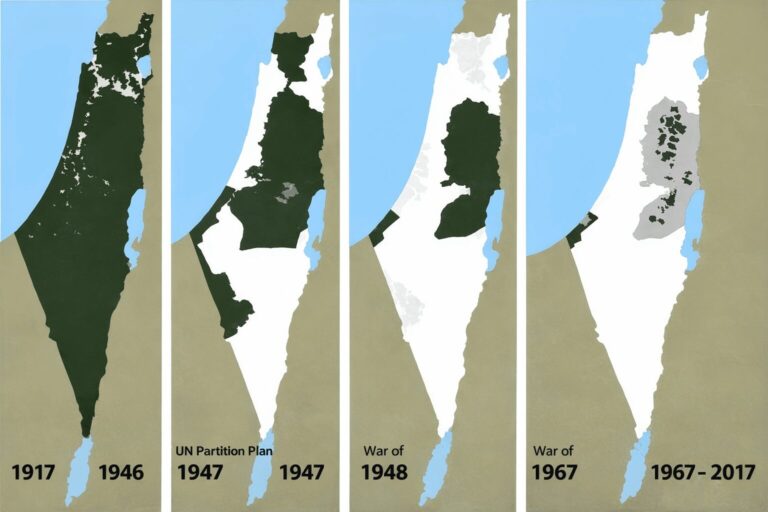Getting On With Co-Governance – Without Debate.
CO-GOVERNANCE, and what it means for New Zealand, is predicted to feature prominently in next year’s general election. Passions are already running high on both sides of this issue. All the more reason, one would think, for this country’s public broadcasters to facilitate a reasoned debate between those holding opposing views. Alas, in 2022, the publicly-owned radio network, RNZ, appears to have either forgotten how to conduct reasoned debate, or repudiated the whole idea.
On the morning of Wednesday, 11 May 2022, RNZ Contract Producer Sharon Brettkelly began promoting her latest contribution to “The Detail” series of podcasts. Entitled “Co-Governance: Time To Get On With It?”, Bretkelly’s piece featured just two participants.
These were Chris Finlayson, former National Party Minister for Treaty Settlements, and Traci Houpapa, Chair of the Federation of Māori Authorities, both of whom were, indisputably, well-qualified to speak on the podcast’s subject. Unfortunately, they were also very strong supporters of co-governance. Brettkelly had not thought it necessary to balance her journalism by including the opinions of equally strong and well-qualified opponents of co-governance.
Now, there will be those who object immediately that “balanced reporting” does not require the arguments for and against any given proposition to be included in the same broadcast. For balance to be maintained, it is sufficient that the views of antagonists and protagonists are presented to the audience fairly, and with equal potential impact, within roughly the same timeframe. So long as Brettkelly, or some other RNZ Contract Producer, created a podcast featuring two well-qualified and forceful opponents of co-governance, all would be well.
Sadly, given the current ideological climate in which RNZ’s journalists are required to operate, the chances of such a podcast being made are extremely slim. To broadcast such a production would be considered a breach of RNZ’s obligations under te Tiriti o Waitangi. It would also very likely be denounced by at least some of RNZ employees as a source of actual harm to their own and other New Zealanders’ well-being.
After all, we have it on the authority of no less of an expert than Chris Finlayson himself, that only the “Sour Right” and other “losers” oppose co-governance. What possible benefit could there be in providing a publicly-owned platform from which the views of people who “don’t like tangata whenua” and who “dream of a world that never was and never could be”, are spewed forth?
As the title of Brettkelly’s podcast suggests, the question is not whether or not co-governance represents a fundamental and unmandated break with New Zealand’s constitutional norms; or even whether it is a politically feasible objective; but whether or not it is time to just get on with the job. Or, to quote Finlayson, addressing those who might still be entertaining doubts: “Go with the flow”. Clearly, among the people Brettkelly and her ilk deem worthy of a RNZ platform, there is no debate about co-governance. Or, at least, no debate in which representatives of iwi, or the Crown, should allow themselves to become involved.
Listening to Brettkelly’s podcast, it becomes increasingly clear that “The Crown” is a player in the co-governance drama who merits much closer scrutiny.
Most of us, when we hear someone refer to The Crown, rather naively (it turns out) assume the term is being used to describe the Government – the body which we, as citizens of New Zealand, elect to manage the country on our behalf.
Wrong, wrong, wrong!
When iwi representatives and Cabinet ministers talk about The Crown they have something else in mind altogether. For these folk, The Crown represents permanent and supreme executive power. It encompasses all the decisive institutions of the New Zealand state: the Executive Council (a.k.a the Cabinet); the senior echelons of the public service; the armed forces and the Police; the national security apparatus; and – most important of all – the Judiciary.
Why is this important? Because the Treaty of Waitangi was presented to the representatives of the indigenous people of these islands by a representative of the British Crown. It was a take-it-or-leave-it deal, that was offered to Māori. Not by the British people, who, in 1840, had bugger-all say in the treaties negotiated by their betters (and still don’t) but by agents of the British state. Māori took the deal precisely because, at that time, the British state was the most powerful executive authority on Earth.
What undermined the Treaty was the steady devolution of authority from the executive power back in London, and from its local representative, the Governor (kawanatanga) to the representative institutions of the Pakeha settlers – whose numbers had grown from a couple of thousand to something equal to or greater than the indigenous population.
In the eyes of these settler governments, the Treaty was not an agreement in which they had played any part, and most certainly was not a document they had the slightest intention of honouring. In the early 1860s, they demanded from London – and got – the overwhelming military force they required to extinguish the Treaty and, along with it, the very idea of co-governance.
The re-birth of the co-governance concept cannot be attributed to the institutions of Pakeha representation, at least, not in the sense that the plan has been endorsed by a democratically-elected Parliament, and then ratified by the citizens of New Zealand in a democratic referendum. It is, rather, the work of Cabinet Ministers and Judges; of the New Zealand executive which has slowly emerged to replace the tutelary power and influence of the British state. The force that now calls itself “The Crown”.
This is what lies behind the tangata whenua’s fear of representative democracy or, as they prefer to call it, “the tyranny of the majority”, and their preference for working with The Crown alone. They understand perfectly what most Pakeha have yet to grasp: that representative democracy was the political instrument that secured their dispossession. They know that New Zealand can have democracy, or it can have co-governance, but it can’t have both.
Fair enough. But how are the citizens of New Zealand to explain the scorn and disdain in which The Crown so clearly holds them? Is it simply because The Crown knows that the measures required to keep the peace between Māori and Pakeha will never receive the imprimatur of a freely and fairly elected New Zealand Parliament? That only under a constitutional arrangement in which Iwi and The Crown between them wield sufficient power to over-rule the will of “The (Pakeha) People” can the instruments of peace be forged?
Is it simply because Iwi and The Crown know that co-governance will never be forged by free and fair debate, but only by them “getting on with it”.







Tauranga needs some cleansing it has become a very toxic place its full of cowardly white supremacist and pakeha women running around calling brown women fat bitches sic!
oh come on whilst we all pronounce our sentiments in ‘english’, the language of the 5 eyes, there is no ‘getting on’ with co-governance
“They understand perfectly what most Pakeha have yet to grasp: that representative democracy was the political instrument that secured their dispossession.”
That is perhaps the most untrue of the many untrue statements made in this article. Maori were dispossessed by the forces of the British Crown, comprising imperial regiments from India and Australia, at the request of a Governor appointed in London. There was nothing that could reasonably be called a democracy in New Zealand at the time. Only property owning male British subjects had any form of political representation.
The British Crown was the problem in 1860, and it is still the problem now. It will not be a party to any supposed “co-governance solution” to our social and political crisis.
Mr Trotter is right to argue that co-governance will end badly, but as always he studiously evades the real problem which is the continuance of the colonialist regime in the Realm of New Zealand.
Excellent analysis, Chris. But just as we must come to recognise that the Crown is not us ordinary New Zealanders of any ethnicity but some elite grouping of politicians and their advisers, doing what we have to believe is right on our behalf, so too – the tangata whenua who are being called into co-governance with the Crown, are not ordinary Maori citizens of New Zealand but an elite of unelected Iwi leaders who owe no responsibility or accountability to tangata whenua but who we all must believe are doing what we all must believe is right on tangata whenua’s behalf. We’re not allowed to question the mandate of either this edifice the ‘Crown’ or this edifice ‘Iwi’ leaders, just as we’re not allowed to question whether any good will accrue to tangata whenua, let alone tangata tiriti as a result.
some seem to not understand what the “co” in co-governance means.
should mean figuring things out together and making sure both are ok with decisions.
it should mean building relatationship rather than separatism.
how on earth did china get in there?
Well said Dave. We already know the Mahuta family have powerful positions in the Three Waters governance.
No matter how many of the ‘People’ vote on anything, the Elite will have the final say. We won’t have Democracy we will have Tribalism and the Elites will then fight between themselves for supremacy, why should I trust any of them.
And if this is not what is going to happen will someone please enlighten me since there has been no debate and I am in the dark.
$Taonga= carbon credits= pine trees. Seems like the dollar is king. We are being sold co-governance as some form of superior-being and well-being and goodbye democracy. What I want to know is where accountability and transparency will be achieved or are we going to slip into a country of cronyism, tribalism, nepotism, and blatant corruption and if one dear criticizes then the treaty is rolled out and the word racist uttered. For all its faults, democracy is a contest of ideas with safeguards.
Co-governance sucks because what if Maori address some of New Zealand’s big issues. That means the rest of us would have to fix those problems too. Bugger that for a joke!
What do you mean without debate? Surely the new Tiriti is going to be transported throughout the country and all our regions’ leaders be asked to sign up to it?!
Stop talking a load of kaka David George, Maori have been treated differently did you not listen to our 97 year old last standing Maori Battalion veteran. Robert Bom Gillies spoke about how badly Maori soldiers were treated when they returned from the war not being able to go pub amenities and given a smaller benefit than our Pakeha soldiers for our welfare system. This treatment had an everlasting detrimental effect on us as a people and this type of superior, hateful and spiteful attitude permeated into NZ society and still exist today. And it doesn’t help with clowns like you talking about fairness and equality ignoring the effects of colonisation.
And what happens when unelected iwi under co governance get friendly or bought by China and do a Solomon Islands? What could the rest of the country do?
Co governance would effectively destroy the sovereignty of the entire country, aside from the gross violation of human rights as equal citizens here.
Co governance in NZ would be a wet dream for China.
Wow KCC I think you might have just confused Māori with current pakeha behaviour ( ok somehow the pakeha are elected)
“how are the citizens of New Zealand to explain the scorn and disdain in which The Crown so clearly holds them?”
Are the people the primary sovereign or not, that is the question.
It’s all very well to pass off the blame for the co-governance agenda to a nebulous “crown” but there is no doubt that the vehicle (and the driver) for co governance is in fact the government; our elected representatives.
There is, thankfully, a glimmer of recognition within government that their path presents far more problems than it solves and that the chance of carrying the people with them is next to zero,
David Seymour from his press release:
Reports that Labour’s caucus has voted to abandon the co-governance aspect of Three Waters is a sign that New Zealand has seen right through their anti-democratic agenda.
I brought the topic up in Parliament today and Labour MPs’ hysterical reactions from across the aisle confirmed what is going on.
Labour’s MPs have read the electoral tea leaves and know their electorates will be telling them not to let the door hit them on the way out if they don’t change the policy. The Caucus has voted to change the policy and remove co-governance aspects in a desperate bid to hang on to their jobs in 2023.
Three Waters was never about solving infrastructure problems, it’s about co-governance. New Zealanders realised this and they have wholly rejected the Government’s plan.
All of the good political movements of the past 400 years have been about ending discrimination on the basis of race, religion, sex and sexuality to treat each person with the same dignity. We are the first country in history that’s achieved equal rights and has division as its official policy. It’s nuts.
Labour has received a rude awakening that the jig is up and voters don’t want their anti-democratic ideology.
ACT says every child born in New Zealand, and everyone legal immigrant, has the same rights. Those are the rights of a citizen. Nobody should get an extra say because of who their great grandparents were. Nobody should have to be treated differently because of who they are.
Decisions areade to include Maori interests when someone says no one owns water or everyone owns it. That’s that’s all. Maori are not for instance wanting to create regiments of solders, battleships and fighter jets to acquire land just for themselves. It’s the crown using ideological cover to acquire land. Maori, atleast the melting pot kind like me want to manage resources for all on our interests and not necessarily for profit.
“Reports that Labour’s caucus has voted to abandon the co-governance aspect of Three Waters is a sign that New Zealand has seen right through their anti-democratic agenda.”
What is he on about? Are you telling me that “New Zealand” (somehow he has spoken to everyone) only had an issue with having Maori representation at the table? I thought the anti democratic piece was effectively removing the right of New Zealanders to elect totally useless local councilors who mismanage “our” water assets and let them fall into disrepair. Of course you can still elect said useless councilors but they will just have to focus on stuffing up other utilities.
They might dump 3 Water co governance component bc too much flak, but other prototypes already implemented technocratic wise in less high profile areas like polytechnics. If they they have to, co governance will incrementally sneaky sneaky be done by elites – filthy White peasants will wake up one morning to a fiat accompli and smirking overlords.
What Act says is only relevant to those without a thinking brain, they will be decimated at the next election and by National. Better to have everyone in the tent pissing out rather than exclude some and have them continualy pissing into the tent.
100% George
It’s hard to fathom just how and why this came about:
Does Arden actually think this is a good idea, despite a 1,000 years of Western history removing tribes, chiefs and kings from positions of power?
Or is she basically hostage to Maori radicals in her own cabinet?
Or both.
Is Ardern hostage to Maori like we are hostage to the British queen
It’s just an act of acting out when normies no not what Aotearoa New Zealand is made up of. We didn’t really lay the ground for formal scientific framework. Before colonization Maori built things without being good scientists but it does mean that Maori persieve the world objecitvly but the question remains is we Maori don’t want to be poor and stupid.
Your bias is showing again Andrew
NZ MSM Propaganda. Jacinda’s $55 million must not have ran out yet. Must be time for a topup soon though. Robbo’s got plenty of cash.